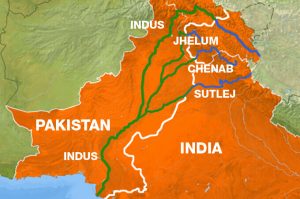Indus Water Treaty:

India and Pakistan have begun another round of the Permanent Indus Commission meeting that is held annually under Indus Water Treaty (IWT) 1960.
- The Indus talks have survived the freeze in ties as both countries see it as mandatory under the IWT.
- Under the provisions of the treaty, the two sides are required to meet at least once every year, alternately in India and Pakistan.
- The last meeting, held on March 23-24, 2021 in New Delhi.
About the Indus Water Treaty:
- It is a Water-Distribution Treaty, signed in Karachi on 1960, between India (Pm Jawaharlal Nehru) and Pakistan (President Ayub Khan), brokered by the World Bank.
- Under the provisions of the Indus Waters Treaty, signed between India and Pakistan in 1960, all the waters of the eastern rivers — the Sutlej, Beas, and Ravi — amounting to around 33 MAF (million acre-feet) annually is allocated to India for unrestricted use.
- The waters of western rivers — Indus, Jhelum, and Chenab — amounting to around 135 MAF annually are largely for Pakistan.
- Under the Treaty, India has been given the right to generate hydroelectricity through a run of the river projects on the western rivers subject to specific criteria for design and operation.
- It also gives the right to Pakistan to raise concerns on the design of Indian hydroelectric projects on western rivers.
- The Permanent Indus Commission is a bilateral commission of officials from India and Pakistan, created to implement and manage goals of the Indus Waters Treaty, 1960.
- The Commission according to the treaty must meet regularly at least once a year, alternately in India and Pakistan.




